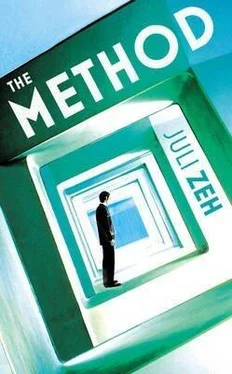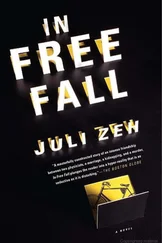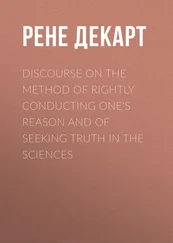‘Are you sure?’ Pollie glances around nervously as if a ghost were ascending the stairs. ‘You mean someone was actually …?’
‘Go on, say it!’
‘Someone was sneezing?’
‘Exactly! It came from the nursery; I was there in a flash!’
‘Sneezing? What nonsense!’ Completing the trio is Driss: tall, slender and without curves, like a sapling. Her flat face rests moonlike on the collar of her white tabard, her big eyes are mirrors, reflecting the others’ gaze. Even without her freckles she would look younger than her years.
‘Why is it nonsense?’ asks Pollie.
‘The common cold was eradicated in the twenties,’ says Driss.
‘Thank you, Fräulein Lightning.’ Lizzie rolls her eyes.
‘There was a warning just recently,’ murmurs Pollie.
‘Did you hear that, Driss? Pollie reads The Healthy Mind . So here’s me, with my heart in my throat, standing in the doorway, and what do I see? Ute’s little lad crouching next to my poppet, who’s got her nose in a bag of pepper — sneezing for all she’s worth!’
Pollie starts to laugh. ‘Goodness,’ she says, ‘they were playing !’
‘She was pretending to be sick!’ says Driss, joining in.
‘Honestly, I could have done with a doctor myself, they gave me such a fright.’
The three women are standing in the hallway, as if to recreate the constellation of the previous day — and the day before that, and every other day. The eternal chain of recurrence reaches forward as well as back, offering the exact same picture for days and weeks to come: Lizzie, propped against the coiled hose of the disinfection machine, Pollie resting on the bacteriometer, and Driss with both arms on the stair rail. The main door opens, and the women stop talking at once. It’s him again: the man in the dark suit. The lower half of his face is obscured by a white cloth, but anyone can see from his eyes that he is dashingly handsome.
‘Santé! Good afternoon, ladies!’
‘I’ve seen better,’ says Lizzie, sticking out a hip and resting a hand on her waist. ‘A really good afternoon is when there’s nothing for us to do.’
Driss points to the man’s face. ‘You know you don’t have to …?’
‘She means you don’t need a hygiene mask,’ says Pollie quickly.
‘This is a monitored house,’ explains Lizzie. ‘You won’t catch anything here.’
‘Ah, the plaque by the door!’ Kramer loosens the band at the back of his head. ‘I should have realised.’
He stuffs the mask into his jacket pocket. Silence ensues.
Since no one is likely to speak for some time, we may as well go over some facts with regard to monitored housing. Certain households, selected for their reliability, have the privilege of carrying out prophylactic measures otherwise performed by the hygiene board. Duties include regular monitoring of air quality, testing of household waste and sewage, and disinfection of all areas accessible to the public. Monitored buildings are identified by a plaque outside the front door and residents are entitled to cut-price water and power. The initiative has exceeded expectations on all fronts: not only does the state save money on public health, but individuals learn the value of community spirit. In the dark and distant past, it was claimed that people were too stupid or lazy to pool their resources and contribute democratically to public life; this view has been discredited. The residents of monitored houses are living proof that humans are absolutely capable of working together for the common good; in fact, they enjoy it. It gives them a chance to meet up, talk and make decisions: to have something to do with each other for a change.
The man before us is positioned among the trio of white tabards with the pride of a stallion among goats. Heinrich Kramer was instrumental in introducing the monitored housing scheme, but he was famous beforehand. There isn’t a person in the country who doesn’t know who he is. This is the reason for the protracted silence and the explosion of chatter.
‘Holy dirt, if it isn’t …’
‘Well, I’ll be …’
‘Is it really you ?’
‘For pity’s sake, Driss, stop staring!’
Kramer places a hand on his chest and bows. ‘The pleasure is mine, ladies. Perhaps you can direct me to Frau Mia Holl?’
‘Mia!’ squeals Driss, clapping her hands. If anyone had asked her which of her neighbours might receive a visit from Heinrich Kramer, she would have picked Mia Holl. Not for any reason — she just thinks Mia is special, that’s all. ‘She lives on the top floor: the apartment with the balcony to the rear.’
‘It’s a nice pad,’ adds Pollie. ‘I wouldn’t mind being a scientist myself.’
‘She does a difficult job,’ says Lizzie reprovingly.
‘I don’t doubt it,’ says Kramer. ‘Is she in?’
‘She’s always in,’ says Driss. ‘Well, at the moment, at least.’ She moves closer as if to impart a secret. ‘We hardly see her any more.’
‘What Driss means,’ Lizzie corrects her, ‘is that Frau Holl is taking a break from work.’
‘Ah, a holiday …’
‘Hardly,’ snorts Pollie. ‘Such a pretty girl and always up there by herself. The poor thing is trawling through possible matches.’
‘We think Frau Holl is looking for a partner,’ explains Lizzie knowingly.
Kramer nods. ‘Thank you, ladies. Now if you’ll excuse me.’
‘Mia’s a decent person.’
‘Herr Kramer never thought otherwise. Honestly, Driss!’
‘This is a monitored house, remember!’
‘Thank you, ladies,’ says Kramer, exiting the circle. He nods to each in turn. ‘You’ve been most helpful. And congratulations on your impeccable house.’
Their mouths are open but no one says anything as Kramer, long legs and elastic body, disappears up the stairs.
‘SINCE LIFE,’ SAYS Mia, ‘is meaningless and yet you have to keep going, I sometimes feel like making sculptures out of copper pipes. I could weld them together and make a crane, or pile them up randomly like a nest of fossilised worms. Afterwards, I’d put them on a plinth and give them a name: “Temporary Structures” or “The Ideal Inamorata”.’
Mia is sitting at her desk with her back to the room; from time to time she jots something down on one of the sheets of paper in front of her. Meanwhile, the ideal inamorata is reclining on the couch, clad in her beautiful hair and the light of the afternoon sun. We don’t know if she understands what Mia is saying or even if she can hear her voice because she doesn’t show any sign of listening or understanding. For all we know, the ideal inamorata may live in another dimension that borders on Mia’s world. Her gaze, as she stares into space, resembles the lidless stare of a fish.
‘I’d like to make something that will last,’ says Mia. ‘Something useless. Things with a purpose become redundant once their purpose is fulfilled. God’s purpose was to give us solace, and look what happened to him! So much for his being immortal. Am I making any sense?’
The room is a mess. It looks as though no one has cleaned, tidied or aired the apartment for weeks.
‘Of course you know what I’m talking about; I was quoting Moritz. “Anyone interested in the eternal must abandon all notion of purpose, including the purpose of one’s continued presence on this earth,” he used to say.’
When the ideal inamorata says nothing, Mia swivels round in her chair. ‘An artist, that’s what he said I should be. He was trying to provoke me. In his view, I was corrupted by science. How can you look at an object, let alone a person you love, if at the same time you’re thinking that everything — the viewer and the viewed, the world and everything in it — is just a mass of spinning atoms? How can you cope with knowing that the brain, our only way of seeing and understanding, is made of the same basic material as everything we see and know? What are we left with? A world of matter staring at itself. That’s how he put it.’
Читать дальше












